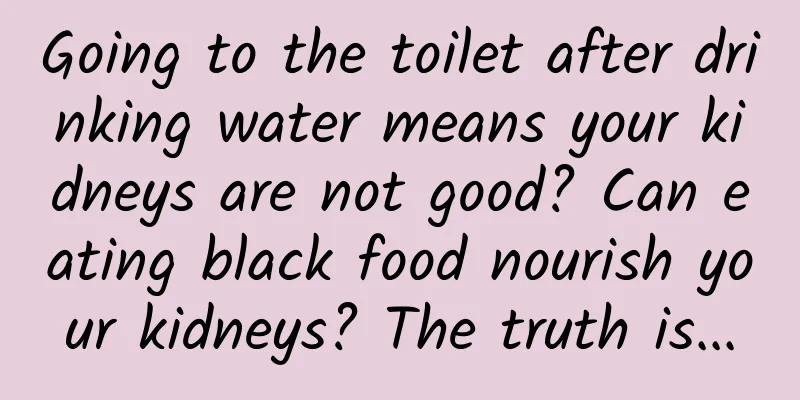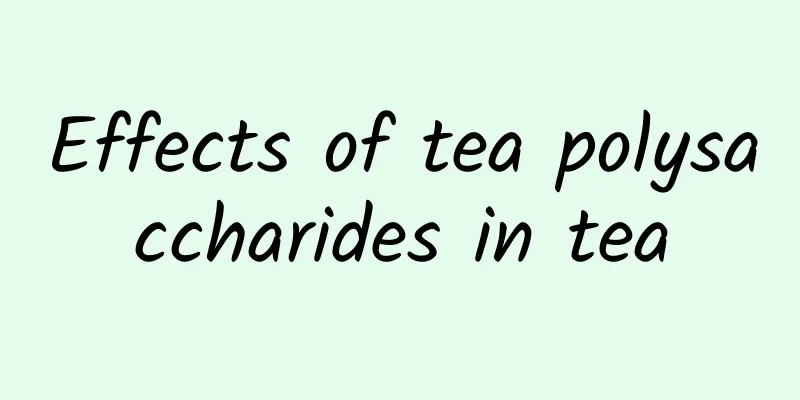Going to the toilet after drinking water means your kidneys are not good? Can eating black food nourish your kidneys? The truth is...

|
The kidneys are the body's "purifiers", filtering blood and excreting waste every day, silently guarding health. However, there are endless rumors about kidneys on the Internet, such as "eating more 'kidneys' can nourish the kidneys", "going to the toilet as soon as you drink water means your kidneys are not good", "white hair at a young age means you have kidney disease"... It seems reasonable, but it is actually misleading. March 13 is World Kidney Day. Today we will analyze these rumors one by one and use science to protect our kidney health! Copyright images in the gallery. Reprinting and using them may lead to copyright disputes. Myth 1: Going to the toilet as soon as you drink water indicates kidney problems This statement is incorrect. Feeling the urge to urinate soon after drinking water does not necessarily mean that there is a problem with the kidneys. It may be a normal physiological reaction. The body's urine production is coordinated and controlled by multiple systems such as the kidneys, bladder, and brain. When a large amount of water is consumed, the body will adjust the water balance and promote urination. If the bladder nerve function is more sensitive, or if a lot of water is drunk in a short period of time, the urge to urinate may appear more quickly. In addition, caffeine in beverages such as coffee and tea has a diuretic effect and will also speed up urination. True kidney disease usually manifests itself in symptoms such as edema, foamy urine (proteinuria), increased nocturia, or abnormally decreased urine volume. Therefore, it is impossible to judge the health of the kidneys based on "frequent urination after drinking water". If you have any doubts, you should see a doctor for examination. Myth 2: Odor in urine indicates kidney disease This statement is too one-sided. The smell of urine is affected by many factors and is not simply caused by kidney disease. Normal urine usually has a slight ammonia smell, but diet, water intake, metabolic status, etc. can cause changes in urine odor. For example, after eating foods such as garlic, onions, and asparagus, the urine may have a strong special smell; not drinking water for a long time will cause the urine to concentrate, which will also make the odor worse. In addition, some drugs and vitamins (such as B vitamins) may also affect the smell of urine. The occasional smell of urine cannot determine whether there is a kidney disease, but if you find that the smell of urine is persistently abnormal, or is obviously stronger than usual, you should seek medical attention in time. Myth 3: Being able to hold urine indicates good kidney function This statement is wrong. The ability to hold urine is mainly related to the urine storage function of the bladder and the control ability of the pelvic floor muscles, rather than a direct manifestation of kidney function. The main function of the kidneys is to filter blood and produce urine, and they are not responsible for the storage and discharge of urine. Holding urine for too long may have adverse effects on health, such as increasing the risk of urinary tract infection and possibly affecting bladder function. Therefore, being able to hold urine for a long time does not mean that kidney function is good. Developing the habit of urinating in time is the correct way to protect the health of the urinary system. Copyright images in the gallery. Reprinting and using them may lead to copyright disputes. Myth 4: Frequent urination at night indicates kidney failure This statement is somewhat one-sided and needs to be analyzed and judged based on the specific situation. Urinating ≥2 times a night is called nocturia. Drinking a lot of water before going to bed, drinking diuretic drinks (such as tea, coffee, alcohol), decreased bladder capacity due to aging, or certain diseases (such as diabetes, prostatic hyperplasia, overactive bladder syndrome, cystitis), etc. can all lead to increased nocturia. In addition, kidney diseases (such as renal insufficiency, chronic kidney disease) may indeed affect the urine concentration function, making increased nocturia one of the symptoms, but "frequent waking up at night" alone cannot directly determine abnormal renal function. If the number of nocturia has increased significantly and has affected sleep and daytime activities, it is recommended to see a urologist. Myth 5: If you have white hair at a young age, it means your kidneys are not healthy. This statement is inaccurate. The formation of gray hair is mainly due to the complex interaction of genetic, environmental, cellular and biochemical factors, rather than being determined solely by the kidneys. The appearance of gray hair is due to the decline in the function of melanocytes, which leads to a decrease in melanin synthesis, which in turn causes the hair to turn gray. If there is a family history of premature graying of hair, genetic factors may be the main cause. In addition, long-term stress, staying up late, and unbalanced nutrition (such as a lack of B vitamins, iron, copper, etc.) may also accelerate the formation of gray hair. Patients with kidney disease may have reversible gray hair due to a lack of certain nutrients, but usually manifest as abnormal urine, edema, high blood pressure, etc., rather than simple gray hair. Therefore, having gray hair at a young age does not directly mean that the kidneys are not good, but maintaining a healthy lifestyle and balanced nutrition can help delay the appearance of gray hair. Myth 6: Frequent back pain indicates kidney disease This statement is not entirely correct. There are many reasons for low back pain. Although some kidney diseases (such as kidney stones, nephritis, hydronephrosis, etc.) may cause low back discomfort, most low back pain is not caused by kidney disease. Common causes of low back pain include muscle strain, lumbar disc herniation, lumbar bone hyperplasia, long-term sitting or poor posture, etc. If the low back pain is caused by kidney disease, it is usually accompanied by other symptoms, such as frequent urination, urgency, dysuria, hematuria, edema, hypertension, etc., and renal low back pain is often dull or bloating, and is not significantly aggravated by pressing. On the contrary, low back pain caused by muscle or bone problems usually worsens during activity or pressing. Therefore, "frequent low back pain" alone cannot determine whether there is kidney disease. If low back pain persists for a long time or is accompanied by other abnormal symptoms, it is recommended to seek medical attention in time to clarify the cause. Copyright images in the gallery. Reprinting and using them may lead to copyright disputes. Myth 7: Eating black food can nourish the kidneys This statement lacks scientific basis. Kidney health is mainly affected by genetics, diet, lifestyle, disease and other factors. Black foods are indeed rich in nutrients. For example, black sesame is rich in vitamin E and unsaturated fatty acids, and black beans are rich in plant protein and a variety of minerals. These nutrients are good for the body, but it does not mean that they can directly "tonify the kidney" or treat kidney disease. If you really want to protect kidney health, you should maintain a balanced diet, exercise moderately, control salt and protein intake, and avoid unhealthy lifestyle habits, such as staying up late, drinking too much, etc.; for food, we should pay more attention to its nutritional value rather than color. Myth 8: Eating more "kidneys" is good for the kidneys This "like cures like" saying has no scientific basis. Eating more "kidneys" will not directly improve kidney function, but may bring health risks. Animal "kidneys" (kidneys) mainly contain protein, unsaturated fatty acids and a certain amount of trace elements, such as iron, zinc, etc. Moderate consumption can provide nutrition, but it cannot directly "tonify the kidney" or enhance kidney function. On the contrary, the purine content in animal kidneys is high, and excessive consumption may increase hyperuricemia and even affect kidney health. The real way to protect the kidneys should include a balanced diet, moderate exercise, control of salt and protein intake, and avoid bad habits such as staying up late and drinking. Myth 9: Drinking water will increase the burden on the kidneys. Kidney disease patients should drink less This statement is not entirely correct. For healthy people, drinking water in moderation can help promote metabolism, dilute urine, reduce the risk of stones and urinary tract infections, and will not cause additional burden on the kidneys. One of the main functions of the kidneys is to regulate the body's water balance, and normal drinking water will not damage the kidneys. However, for some patients with kidney disease, such as those with severe renal insufficiency, renal failure, or significantly reduced urine volume, the kidney's drainage capacity is impaired, and the relationship between white water intake and the progression of renal failure is U-shaped. The optimal water intake range may be 1L~2L per day. The specific amount of water to drink should be adjusted according to the specific condition and evaluated by the doctor, rather than blindly "drinking less water." Have you fallen into these rumors? Correct and scientific maintenance of kidney health is crucial, so how to do it? The following points can be used as a reference: 1. Maintain a healthy weight and keep blood pressure and blood sugar stable and normal. 2. Limit salt (sodium) intake, such as processed foods, pickles, etc.; increase fiber-rich plant foods, such as fruits, vegetables and whole grains. 3. Avoid nephrotoxic substances and use drugs and health products rationally. 4. Drink an appropriate amount of water every day to keep urine clear and avoid urinary tract infections. 5. Ensure adequate sleep, avoid staying up late, and do moderate exercise, such as brisk walking and yoga, to enhance cardiovascular and kidney health. 6. High-risk groups (diabetes, hypertension, family history, etc.) should have their kidney function checked at least once a year. 7. Pay attention to changes in urine, such as foamy urine, hematuria, etc., and seek medical attention promptly. References [1]Skrajnowska D, Bobrowska-Korczak B. The Effects of Diet, Dietary Supplements, Drugs and Exercise on Physical, Diagnostic Values of Urine Characteristics. Nutrients. 2024;16(18):3141. [2]Jagtap S, Harikumar S, Vinayagamoorthy V, et al. Comprehensive assessment of holding urine as a behavioral risk factor for UTI in women and reasons for delayed voiding. BMC Infect Dis. 2022;22(1):521. [3]Jin Z, Zhang Q, Yu Y, et al. Progress in overactive bladder: novel avenues from psychology to clinical opinions. PeerJ. 2023;11:e16112. [4] Chinese expert consensus writing group on clinical diagnosis and treatment of nocturia. Chinese expert consensus on clinical diagnosis and treatment of nocturia. Chinese Journal of Urology, 2018, 39(8): 561-564. [5]Poonia K, Bhalla M. Premature Graying of Hair: A Comprehensive Review and Recent Insights. Indian Dermatol Online J. 2024;15(5):721-731. [6]Latoch A, Stasiak DM, Siczek P. Edible Offal as a Valuable Source of Nutrients in the Diet-A Review. Nutrients. 2024;16(11):1609. [7]Wagner S, Merkling T, Metzger M, et al. Water intake and progression of chronic kidney disease: the CKD-REIN cohort study. Nephrol Dial Transplant. 2022;37(4):730-739. [8]Li PK, Garcia-Garcia G, Lui SF, et al. Kidney Health for Everyone Everywhere - From Prevention to Detection and Equitable Access to Care. Indian J Nephrol. 2020;30(2):63-71. Planning and production Author: Jiang Yongyuan, Master of Internal Medicine, Third Military Medical University, Popular Science Author Review|Xiao Yongshuang Chief Physician of Urology Department, Affiliated Hospital of Xuzhou Medical University Xue Mingwei, deputy chief physician, Department of Nephrology, Xingtai People's Hospital, Hebei Province Planning丨Zhong Yanping Editor: Zhong Yanping Proofread by Xu Lailinlin |
>>: @Insomnia Star: Melatonin VS sleeping pills, which one should I pick?
Recommend
Can hyperthyroidism be cured? What are the symptoms of hyperthyroidism?
Hyperthyroidism is an endocrine disease. People w...
How long after having an abortion can I wear a ring?
Wearing an IUD can have a long-term contraceptive...
What is the nutritional value of kiwifruit? What are the benefits of eating kiwifruit?
The kiwifruit is a small "mini" fruit w...
What are the symptoms of endometrial bleeding?
Do you know the symptoms after endometrial bleedi...
I'm pregnant but I don't want it
Nowadays, with the increasing number of people en...
What are the symptoms of Candida positive?
Candida is a relatively common disease. Many wome...
What is third-hand smoke? | World No Tobacco Day
Can adding filters to cigarettes reduce the harm ...
There are several types of cervical lesions
In recent years, cervical cancer has received inc...
Itchy calves during late pregnancy
When women reach the late stages of pregnancy, it...
How long can a woman live with kidney atrophy
Although organ transplantation technology has dev...
Frequent and strong fetal movements at 6 and a half months of pregnancy
By the sixth month of pregnancy, the baby has gro...
Cervical intraepithelial lesions
Cervical intraepithelial neoplasia refers to the ...
What medicine should I take for throat inflammation during breastfeeding?
Pregnancy is a process that most women go through...
Causes, symptoms and advice for vaginal bleeding after sex
A few days ago, I found that many people were ask...
What to do if menstruation does not come at 44 years old
Normal women begin to enter menopause at the age ...









